Image + Word Interview 4 : TABLOID press
Posted on July 27, 2020
For the fourth installment of Image + Word, PromptPress interviewed editors Nat Marcus & Zoe Darsee from the Berlin-based experimental publishing platform TABLOID press.
TABLOID publishes and produces an extensive variety of art and poetry under its imprint with the hope of creating space to “bust poetry off the page.” Printed on garments, unbound books, and newsprint, TABLOID curates a collection of curious voices.
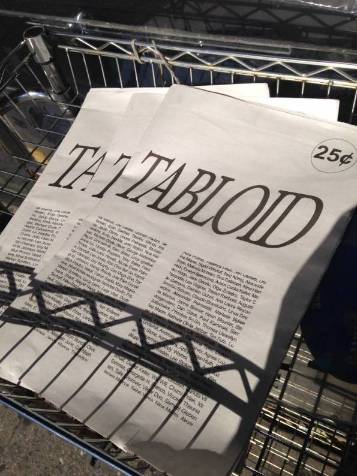
PP: You started TABLOID in 2014 with the intent to stimulate and integrate poetic environments within social communities. What did you see as lacking that this particular interaction between poetry and society could solve?
NM: I think Zoe wrote this elegant “intent to stimulate…” sentence a few years ago – as is, I think it’s on point; it’s also a way of saying in Latinate diction that we want poetics to be a source of commentary and force of collision within a group of people. Something capable of reflecting the scene, and in doing so, pulling flux through it. Sometimes I flip the adjectives to “social environments within poetic communities” and the mission still holds: our activities are means of innervating the body (be it collective or individual) with lyric.
When me and Zoe started TABLOID, I was studying at Oberlin College’s Creative Writing department; she had just graduated from the same program. Perhaps a moment a lot of poets must go through – to recognize that these charged fields of text are largely thought of as belonging to a genre to shrug at, dust of the canon. We wanted our love interests and new confidants and hoards of cackling gays we met at nightclubs to read poetry like it was burning content. So we started writing about them.
ZD: To echo Nat, we were both really against the isolationist delicacy praised in the institution, it made poetry a dead, asocial thing. Poetry lived for me in finding other poets and just talking, playing with talking. We weren’t in contact with other publishers or bookmakers at the time, so we felt that vacancy all the stronger.
We wanted to configure the distribution and performance of our work in a way that could also bridge a “scene”. To enter a dancefloor as a poet and let the dancefloor enter the poem. We also hoped to, kind of, condone a stretched vocabulary in our immediate community, by making our own texts and the design of those texts accessible and relevant to the people around us. At first we just wanted to see what would happen. TABLOID #1 was the invitation to play.
PP: TABLOID is currently based in Berlin. I’m curious how your mission of integrating poetry and community is different here than it would be if you were in the states.
ZD: I grew up in Austin, TX. I spent three years there in the interim between TABLOID’s conception and its current activities in Berlin. Much of TABLOID’s practice was actually developed between Austin and Chicago, where Nat lived before moving back to Berlin. In 2015 and 2016 I was organizing readings and facilitating poetry workshops at a now-defunct gallery space called ATM gallery. This experience was really positive and experimental. Experimental, in the sense that artistic practice was supported and encouraged. There was a lot of room for experimentation and encouragement. The audience was limited, intimate. And there was little else going on, so you had to create it. In a small town or city, especially, there is a responsibility to that.
I found that many people who attended these workshops in Austin felt alienated by the financial or qualitative exclusivity of MFA institutions at large. By no means did that mean they weren’t interested in developing their writing practice. Even with the abundance of MFA programs in the States, there seems to remain a lack of spaces for creative experimentation and non-hierarchical feedback. In high school, I had felt this lack of literary interest distinctly, but I realized later it was not the fault of the students, but the institution which had privatized and academicized literature’s accessibility and therefore, its potential for pleasure.
My experience in Austin was foundational. I realized it isn’t about where you are, but how people gather and support each other. Anyone can do these workshops in any city. It is important to uphold this practice for ourselves and our own writing, but also as an example of a kind of DIY attitude, as encouragement to people who feel a lack of this literary vibe or possibility for collaboration in their own cities or villages.
It is also through enacting these practices of TABLOID, through leading workshops and making books and hosting readings, that we have come into contact with many of the poets and artists we collaborate with today.
NM: There are also many less creative writing programs, in Germany and Europe at large. Without the kind of institutional structure a university provides – convening writers and poets in a certain location to study and share work, or serving as a kind of hub for communicating with other artists and institutions – we are largely left to our own devices to participate in this integration of poetry and community. In many ways, it is a boon. I think we are both just grateful to build the relationships we have with other poets, galleries, printers and bookshops in the past years; we take none of it for granted because we were granted none of it here to begin with.
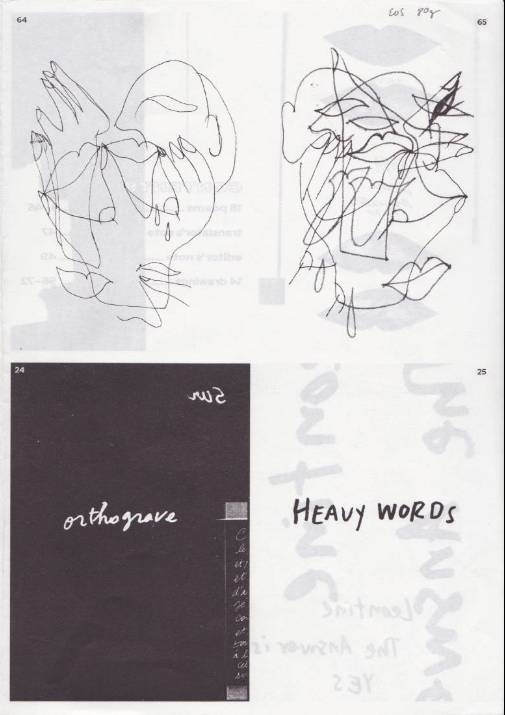
PP: Is your editorial team a mix of Americans and Berliners? Do you publish work that is both German and American?
NM: The team is in fact a partnership – it’s just Zoe and I running things. And so far, we’ve just published texts in English. When we did a residency at our friends’ project space Blake & Vargas a few years ago, the visitors would convene for the poetry readings and then naturally spill out onto the sidewalk – during one of these intervals, a middle-aged German man and woman rolled up and started moaning about the fact that they had no idea what constituted this crowd standing before them. It turned into a debate with our friend Sarah, one of the people who runs the space – the prosecutors were drunk and spoke from a very true vantage: without any readings in German, how was this series of events we had planned capable of dialoguing with Berlin, or with the rapidly gentrified Kreuzberg neighborhood in which it took place?
Perhaps TABLOID only could’ve started in the floating, aloof relationship we had, and many expats have, with Berlin, as well as German language and culture – the posture is cosmopolitan, tends to be a bit reckless, and at odds with the surrounding cultural codes. But our relationships to this place have deepened; in large part we’ve grown up here; we owe a lot of ourselves and our work to this city – in line with all this, we’re publishing our first full German text in an upcoming collection, a script for a radio play written by our friend Christina Esther Hansen.
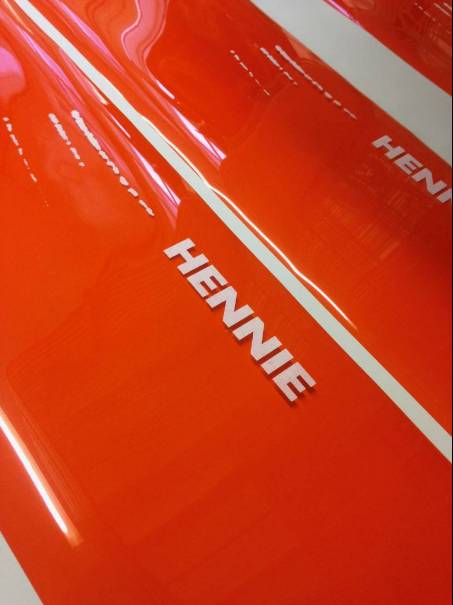
PP: You recently released a 20-page poem series by Zan de Parry titled 'Hennie'. Tell me about this project and what drew you to it in the first place.
ZD: Zan actually found TABLOID, somehow, a few months after he moved to Austin. I think he came to a reading we had at Farewell Books, a very special bookshop and gallery that closed in 2017. I’d like to make a small shout out – Farewell was really instrumental to TABLOID’s beginnings – we had our very first release there, which was followed by a number of other events, pop-ups, and readings. They also carried our books.
Anyway, Zan wrote to TABLOID through our bigcartel, and later that day or the next he met me at the coffee shop where I worked, I poured him an espresso, spilled out some conversation, and I got an email later that day with a scan of a book he’d had printed in Michigan. Nat messaged me a few days after saying something like, wow, this Zan guy’s writing is really out there. That was true, in that it was really different from anything I’d read. I had an immediate sense that it was “good”. A few months later, he sent me the manuscript for Hennie.
NM: I’ve never actually met Zan in person – Zoe started telling me about him and sending along some poems of his a few years ago, when she was still in Austin. His work always feels like the articulation of a logic that is autonomous, belonging to the poems themselves (no doubt Zan wills or channels it, but I think his poems are so great because they don’t entirely come from him). And all the same, it is not nonsense – or it’s nonsense that’s been tuned, sculpted. There’s such humor in his work, and such delicate attention to sonics. He knows how to let poems issue their own chimes. Zoe was really the engineer behind the whole book – its layout and construction. I carried out the service of cutting and silkscreening the plastic dust jackets, as well as the ISBN on the book itself. I’d say each publication allows us to reformulate our partnership, take on different roles, allow the shape of our collaboration to remain liquid.
ZD: Much of TABLOID’s process is witnessing play, keeping design on the side of experimentation. Hennie’s design came from a photo of a projection of words across a wall, from an angle - we like to work with this border between the physicality of text, referential to another experience of witnessing it, more public, outside of the privacy of a book.
PP: At PromptPress, we are especially interested in process and how new work is created at the intersection of form. Can you give me any insight on the process of TABLOID? How do you progress from idea to work to publication?
NM: As much as we are adherents to poetry and poetics as a force, something that rests upon intangibility, we are also lovers of objects. And books as physical things, textual objects, in particular. It had been a while since we had put out a small-run publication together (in the last years we organized many more events, and the texts we printed were risographed onto posters or silkscreened onto shirts), and the process of printing, cutting and folding the dust jackets for Hennie with Zoe really reminded me how important it is to have our hands (and vitally, the errors they are capable of) inscribed in the material production of our works. Once a physical form consonant to the semantic and affective forms of the text is chosen, there always needs to be some passing back and forth between Zoe and I, or a way in which the publication bears both of our accents.
ZD: To add to that, form echoes content. The books want to match, or compliment, the poems that they house, so that the book itself can be an example of communication between poet and publisher, a house for the text. This is an important part of the process for me. I can’t stress this foundation enough, because sometimes, at book fairs, no shade, I see many books that are beautifully designed, which speak to the eye but not to the ear. That is a bit too two-dimensional for me.
Our most recent book, Hennie, the manuscript of which Zan had sent me in 2017, took years to ripen, design-wise. With this text, as well as M. Elizabeth Scott’s Dumb Supper, through reading and re-reading, the form of the publication materializes. Materials are my focus in our collaboration: it’s about the texture of the paper, physical interaction through layering of vellum or plastic or variation of color, and printing processes on that paper. I think about how the book will be held, unfold or lay open. Will it fit in the hand, in a pocket, will the arms need to stretch to open it? Where will it be read, on a train or at home, in a gallery? The method of interaction influences the experience and the understanding of a text. We never want the book design to eclipse or obscure the content without good reason.
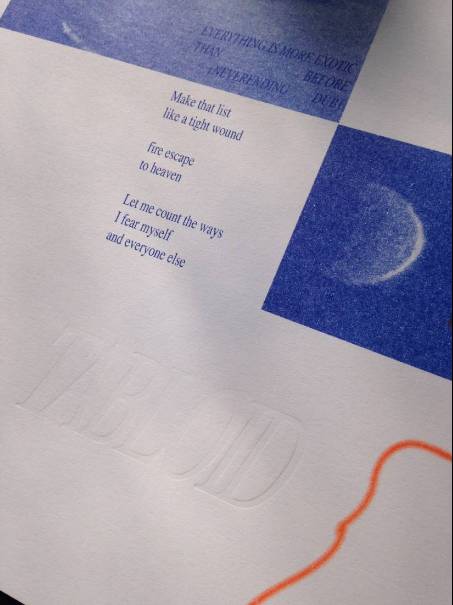
PP: How did you decide on the name TABLOID? What does it mean to you?
NM: Like any institution, we might rest upon a myth: I don’t actually remember who came up with TABLOID, or when exactly, it just came into being, and came to be the title of our publishing house because it seemed to properly reflect our efforts of inverting what we knew so much poetry to be as a cultural product – sentimental or bone-dry conceptual texts in little books. We wanted to put out a cumbersome object, possibly lurid. Chitchat in large format that was at the same time wholly sincere.
In November we organized a reading that really had this ethic and spirit dancing through it: there was a constant stream of clashing commentary between audience and poets; the audience itself was made up of friends, friends of friends, teachers, teachers’ daughters and fathers; people fell out of chairs; the poems were modeled on reality TV scripts or wholly anecdotal; names were dropped; our friend Labrilena was visiting from Greece and extracted oil from jasmine and lavender flowers throughout; I read some love poems that took as their subject a friend of ours sitting in the audience; everyone knew; he knew, but maybe not to the extent by which that love was performed by the poems; some weeks later we talk about it because at that point we must, and our friendship takes on a different shape. All this to say – it’s oversized, a bit sexy, a bit messy, prizes the sensual; very much a family enterprise. You can listen to the recording here.
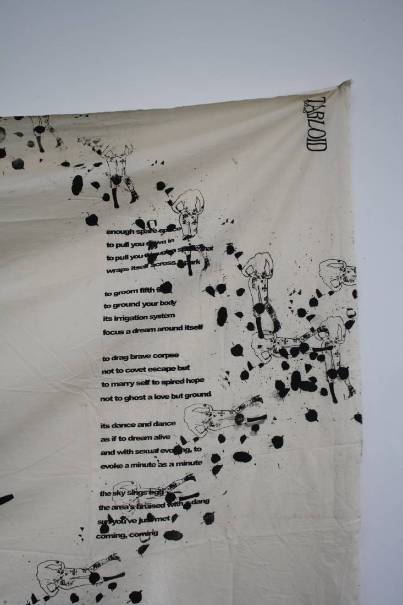
PP: TABLOID refers to itself as a textual platform but you present and publish a wide variety of non-textual work. I see you do a fair amount of work that pairs audio and the written word. Why is it necessary for TABLOID to press the boundary of text this way? What do you find when you reach beyond the traditional written word?
ZD: What we are doing is not publishing in the sense that we are limited to the book form, to the magazine, to the printed word. A reading is both a recitation of a text as well as its own, deliberate, embodied alteration of that text, embracing error and pause and accent and slur. We’ve thought about how a residency could be a publication. A series of events could be a collection of pages in the memory. We’re celebrating performance, too. There is a difference between a poem on the page and one delivered from the mouth. It’s always been clear that poetry moves between these modes of expression, silent and sounded, written and spoken. Something happens when you move from text to speech. People feel more connected to verbal forms of communication because they use them everyday. Music is also a basis for connection, for feeling. When put to sound, suddenly poetry moves towards something accessible via the potential for a physical reaction. It becomes more interactive, embodied.
NM: Like Zoe wrote, we like to consider publications not just as books, printed text, but any media made public under our TABLOID imprint. We’ve always been attentive to and curious about the publics that are in turn created by these books, mixes, shirts, prints and so on: our audience and our poetic subjects form a rich feedback loop. We also just want to bust poetry off the page – until the point we relish putting out a book again, plainly, like Hennie, or more recently, the anthology of drawings and poems by Vava Dudu.

PP: What’s next for TABLOID? How are you pressing forward into the new year?
NM: It’s been more than half a year since we initially answered these very generative questions – in the span of seven months the world has passed through a few convulsions. In a way I feel as though we have to let this year press into us and shape our activities; it’s a time to be acutely and intentionally responsive. During the first weeks of the COVID-19 lockdown Zoe proposed to start printing a simple chapbook series, monthly maybe, to be delivered around the city by bike (a beautiful business model that a lot of friends were carrying out at the time), and whose proceeds would cycle back to the poets, many of whom were suddenly without income. Naturally this project has turned wholly into a book, stretched out in the summer pacing, and will be finished later next month as Berlin’s distance and buffering protocols are gradually lifted. This is also, often, the tempo of publishing we must accept. On the other hand, we answer to the great call of rage and soul issuing from the US since the murder of George Floyd. In this case, it’s been most important to act in urgency – namely, liquidating a lot of our backstock, and directing the funds to our fam and collaborator Yves, who is organizing the Herbal Mutual Aid Network in Los Angeles. This summer is going to see more production of shirts and prints to support her initiative, as well as the advocacy and organizing work of Brandenburg’s Women in Exile e.V.
ZD: I do think it’s healing to create a book, to open a room for experimental communication, to focus on play and not perfection. Our activities have naturally slowed with the pandemic’s restrictions, but these restrictions have made distribution an even more generous and significant practice. That is, distribution of information, opportunity, and of funds. As Nat has said, it’s clear we need to act in urgency - socially bound and fed as we are, this, too, is part of the practice.